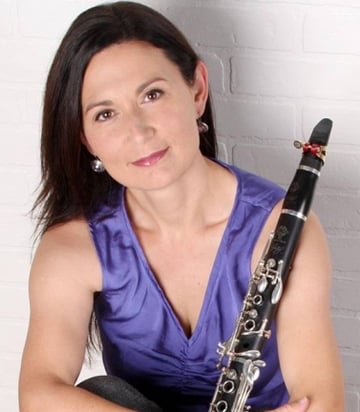Faculty voice: Elevating life through music
Tasha Warren reflects on everyday freedoms after a study abroad experience.
Tasha Warren is an assistant professor in the College of Music. She is an avid teacher and international performer, and has premiered over one hundred works for solo clarinet and chamber ensembles. She has recorded extensively with notable chamber groups and as a soloist.
Until recently, the lack of freedom to travel and see the world sounded as foreign to me as hoarding toilet paper and flour. As a professional musician, the loss of freedom to perform, period, was pure science fiction. Yet here we are, living in a world shrunken onto itself, antithetical to the pandemic we are trying to contain.
On March 8, 2020, I returned from India after leading a study abroad program through the MSU College of Music in partnership with Pitch Pipe Foundation — an organization founded and directed by Spartan alumna Jennifer Heemstra, an international concert pianist and musical philanthropist.
The trip had been planned for a year-and-a-half, and consisted of a concert tour in Kolkata as part of Jennifer’s Kolkata Classics series. Apart from addressing my class the day after we returned, this trip would be my last in-person interaction with other human beings besides my family for the next three months, as Michigan looked to contain the spread of COVID-19.
When I first met Jennifer, I felt an immediate sense of kinship when she told me about Pitch Pipe and its mission of “Linking Great Artists with Great Need.” Jennifer founded Pitch Pipe in 2017 after years of philanthropic work. Concerts associated with the foundation initially began in India, then Tajikistan, Nepal, and the United States. Her goal is to expand the foundation and to reach every corner of the globe.
When I proposed a small study abroad program in connection with Kolkata Classics, Jennifer responded with immense enthusiasm. Our program included arrangements for our clarinet quartet, as well as pieces featuring clarinet and Jennifer on piano.
We planned a 12-day trip, first flying to Delhi to sightsee, visit the Taj Mahal, and then fly to Kolkata to begin a week of intense performing. In the end, we offered seven performances within the span of five days, and had the opportunity for rich and beautiful experiences in between.
It was only when we boarded the plane from Mumbai to Amsterdam that we realized our trip was over. Twelve days had gone by so fast, and every encounter was too rich to fully appreciate in the moment. This experience would live with us forever, and it was only after I snapped my seat belt that I had a moment to contemplate its depth.
I began to journal everything I could remember — compulsively, emotionally — as the tsunami of recent memories engulfed me. Coronavirus was sliding its foot in the door of the world.
All around us students were cutting short their study abroad trips and vacations. Temperature checks and mask wearing became increasingly common. As I began to write in my journal, the beauty of our India experience converged with a now undeniable fatigue, and I hoped no one could see the tears dampening my mask.
Now, sometime later, I treasure this chance we had to travel, and to perform for and with some of the most amazing people I have ever had the privilege to meet. In times of crisis, it is easy to romanticize. But musicians truly need to perform and need music to survive.
As we continue to shelter in place or restrict our activities, we sometimes express frustrations at how difficult it is to be apart from one another. Today, moments that once appeared trivial and mundane seem like treasures beyond our reach. While we bemoan stay-at-home orders and “social distancing,” we sometimes overlook the luxuries and freedoms we have, failing to see they are not afforded to everyone.
Only now, after putting it all in words, do I see with remarkable clarity why we need to do what we can to make a difference. The reason is simple: Because we can.
This post is pulled from Tasha Warren’s journal recounting her 12-day trip to India that details performing in urban districts and in remote villages, in schools and performance halls, in market squares or industrial centers and on a makeshift stage adjacent to India’s largest red light district. To read the full account of her immersive study abroad and performance experience in Kolkata, India, click here.
